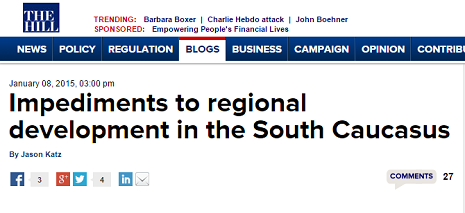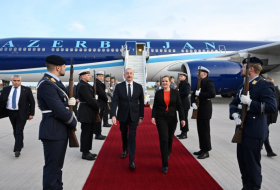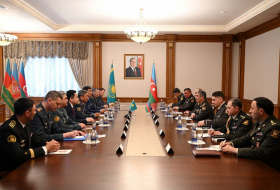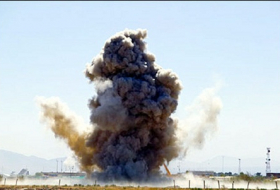Comprised of Georgia, Azerbaijan, Armenia and peripherally Turkey, the South Caucasus region is, mostly, energy rich and stands as a much needed and viable alternative for European natural gas supplies in the near-term and well into the future. Read that as an alternative to the chaotic, military and foreign policy driven natural gas from Moscow.
Recently, the foreign ministers of Turkey, Azerbaijan, and Georgia met in Turkey`s northeastern province of Kars to discuss regional cooperation. This fourth trilateral summit included meetings between Azerbaijan`s Elmar Mammadyarov, Georgia`s Tamar Beruchashvili and Turkey`s Mevlut Cavusoglu.
Conspicuously absent from this meeting and, indeed, from all discussions on regional development, energy and general regional prosperity was Armenia. Armenia, another former Soviet Republic, has oddly chosen to excuse itself from the growing prosperity of the region.
Why, you ask? Armenia has taken a decidedly different path, a path that has necessitated all but the complete surrender of Armenia’s sovereignty. As the other nations of the South Caucasus have embarked upon and continue to navigate independent foreign and economic policies leading to prosperity for their people, Armenia has increasingly become a vassal state of the Russian Federation in direct contradiction to the best interests of their people.
Armenia’s borders and airspace are patrolled by Moscow. In fact, Armenia is the last of the former Soviet Republics to host Russian military bases, even recently signing agreements to keep them there well into the coming decades - 2044. Recently, Russia`s FSB, a successor to KGB, issued a press statement about its operation in Armenia, nominally a foreign state! As the South Caucasus region and surrounding regions seek closer links with the European Union, Armenia has opted to join Russian President Vladimir Putin’s personal attempt to usurp the EU, the Eurasian Customs Union suddenly interrupting its half-hearted talks with EU. Armenia even joined nations like North Korea, Syria, Sudan and a couple of other rogues, voting against Ukraine`s territorial integrity at UN in 2014.
This is all done against the backdrop of an increasingly poor nation in Armenia and a severely dwindling population as a result of mass exoduses of Armenians to other nations due to the dire economic situation there.
The answer to Armenian prosperity is sadly quite simple. Leave behind the shackles imposed by the Russians, past wars with Azerbaijan and embrace the future, again in the best interest of the Armenian people.
At the twilight of the Soviet Union, Azerbaijan and Armenia fought a war over the Azerbaijani lands of Nagorno Karabakh and its surrounding districts. The Azerbaijanis lost the war as a result of the significant help rendered by the Red Army and Iran. Following ethnic cleansing of Azerbaijanis in Nagorno Karabakh and surrounding regions, Azerbaijan possesses nearly a million refugees, designated as internally displaced peoples. In their place is an unrecognized area, even by Armenia, seeking to be the second failed Armenian state. During the fighting, Turkey closed its border with Armenia in solidarity with Azerbaijan.
Fast forward more than 20 years and the entire region is fabulously prosperous while Armenia stubbornly holds on to Azerbaijani lands and is thus left in the cold. It would seem to make sense to the Armenian leadership and Armenian diaspora, but to few else on the global stage.
Speaking at a joint press conference following the meeting, Cavusoglu of Turkey eluded to the real players, the afore mentioned nations, hold out hope for Armenia’s involvement, as Turkey’s Cavusoglu pronounced that Turkey supports respect for Azerbaijani and Georgian territories, adding that he hopes Armenia will also cooperate.
Azerbaijani Foreign Minister Mammadyarov added that problems between Azerbaijan and Armenia have yet to be solved. "International agreements should be the basis for a solution," said Mammadyarov.
Armenian leadership must do itself a favor and in doing so save the sovereignty and viability of their nation.
Return the occupied lands of Azerbaijan with an ironclad agreement that Azerbaijanis will return to their homes and lands and that ethnic Armenians will be protected and given the same rights as any other citizen of Azerbaijan.
Based on this gesture, work with Turkey to reopen their mutual border. If events of WWI are an impediment to these negotiations, agree to a tribunal of scholars to explore exactly what happened in WWI and what to do about it all these years later.
Work to repair ties and relationships with Georgia, Azerbaijan and Turkey.
Force the Armenian Diaspora to use the considerable money spent on lobbying related to the issues of events in WWI and Nagorno Karabakh to invest in Armenia’s economic survival.
Following these steps, engage in talks on regional development and be a player in existing and future projects.
Azerbaijan, Georgia and Turkey are open to solving this frozen conflict, furthering and expanding regional development and integration and most of all Armenia will be better off and stronger for it.
Katz is the principal of TSG, LLC, a consultancy that advises foreign governments, NGOs and corporations in the realms of strategic communications, politics and policy. He is also the former head of Public Affairs and Public Relations for the American Jewish Committee, based in Los Angeles.
More about:
















































